
Cultivating awareness by cooking up a 'rescued food' feast
Cooking. We watch television chefs do it or pay for an unseen soul in a backroom restaurant to do it for us. We might leaf through glossy cook books and resort to old favourites in our kitchen. We do it for love and care of those around us, for comfort or the simple and sometimes unexpected magic of transforming mundane ingredients into tasty, steaming meals. But how often do we do it in public, or with total strangers, or…at a disco?
Last week’s debut Disco Soup for Manchester served up all of this and more. Not only was there transformation of ingredients, there was transformation in awareness and cooperation - not only about chopping techniques, but specifically about the provenance of the ingredients on offer.
Arriving in the morning, our team of chefs cooed over half a tonne of food - boxes of muddy parsnips, gleaming yellow peppers, multi-hued tomatoes. All had been ‘rescued’ on the way to being thrown away. Throughout the previous week, teams of volunteers ‘gleaned’ fresh produce rejected by businesses or donated by local ‘dumpster divers’. Our aim? To show that much of the food thrown away is perfectly edible, and to equip people with positive tools for preventing food waste.
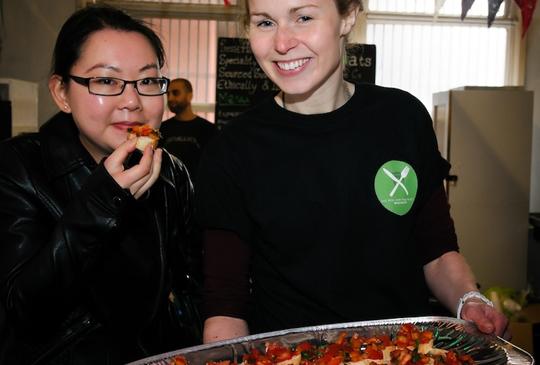
Spearheaded by the Real Junk Food Project Manchester and held at the Wonder Inn (soon to be transformed into Shudehill’s ‘creative wellness centre’), Disco Soup combined daytime family fun with an evening party; a veritable food waste ‘feastival’ of talent and possibility. An army of chefs were enlisted to lead tables of volunteers and passers-by in the mass cooking.
Fennel and oranges were snapped up to make salads while tomatoes and fresh herbs or horseradish, anchovies and cucumber slivers were piled atop bruschetta (paraded around on platters by enthusiastic youths). Others zoned in on the giant boxes of just-out-of-date dates, slabs of unwanted chocolate and jilted nuts to produce trays of glossy vegan truffles.
Elsewhere, plates were piled with strawberries and leaves and strewn with roasted peppers with juices to be mopped up by cheese toasts. There was saag daal, linguine with fresh tomato and pepper sauce, pasanda, vegan sausages, stove-top savoury tarte tatin, creamy-yet-piquant risotto, vegetable stews, trays piled with parsnip chips, mango salsa, bananas melting in butterscotch and much else besides.
Disco Soup is a global movement, originating in the delectably-named ‘Schnippel Disko’ in Berlin and made famous by French freegan activists who’ve inspired over 100 events worldwide. Others root the movement in the theatrics and free food distribution of the San Francisco Diggers of the late sixties. The UK’s first Disco Soup was held in Oxford and has inspired many more; Liverpool recently held a ‘Disco Scouse’ event!
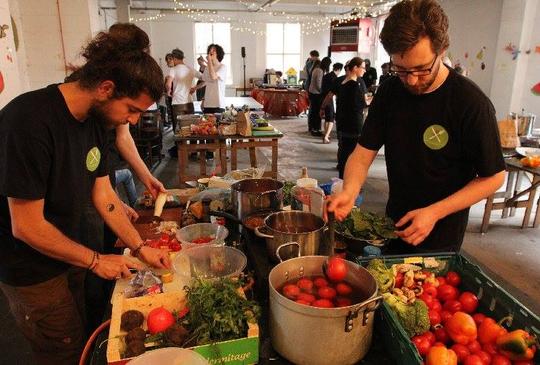
Disco Soups vary according to local needs but share a few core principles: open participation in cooking and eating and having fun while giving a serious boost to local efforts to fight food waste and “fill bellies not bins”. It was free to take part, and a team of hula-hoopers and volunteers lured in passers-by. DJ Peachy provided tunes to chop to and there were hula-hoops, face paints, and an interactive ‘save the wonky fruit’ game by Playfuel. Cracking Good Food’s interactive games suggested how individuals can reduce food waste at home: how much raw rice to cook, using the freezer and reheating (rice is fine- just make sure it’s piping hot!).
Local graphic designer Jane Bowyer created starkly beautiful posters to make flooring food waste facts seem more imaginable: the 13000 slices of bread discarded by just one retailer would stack as high as the Beetham tower. Every day. But the main lessons of the day came from the creativity of the cooking teams, who had to think on their collective feet to come up with quick, stove-top dishes with limited equipment and imperfect ingredients. Under the yellowing outer leaves lay perfect hearts. Pare away the gooey bit and you’ve got the makings of a beautiful salsa.
Magic was everywhere - the faces of those who tasted the circulating food, the pride of those who cooked and shared it, the beauty of the finished dishes and conversations crafted over sticky fingers. Kids and grown-ups tried things they’d never eaten before- with some happy results. Cooking leader Gill Watson told me of a little boy with autism who rarely leaves the house; he latched on to her and got thoroughly stuck into cooking fossil pizzas. A bike-powered smoothie maker churned through the boxes of summer fruits and mangoes to keep everyone refreshed (thanks Roar Juice!).
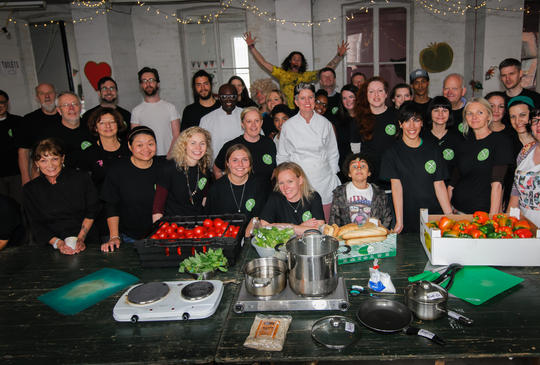
An aside - where did those mangoes come from? While some of the produce required chopping and coaxing in spices and sauces to rejuvenate its beauty, the mango needs little embellishment. Not when it’s this ripe - soft to the touch, it’s just past its pertly-sellable phase. I spent a morning with the hardworking crew charged with processing the produce rejected by traders at a local wholesale market. It would normally be sent to a farm as animal feed or turned into compost but the company allow FareShare (the surplus food redistribution network) to intercept anything suitable to be sent to community organisations and fed to people.
It was masses of work - unsheathing pallet-loads of cucumbers from their plastic sheaths, emptying near-perfect grapes from their plastic boxes. Then the mangoes arrived. They come in pretty cardboard boxes marked with a Pakistani flag-waving kid whose air vent is covered with a little mesh to keep out the flies, each mango lying on a wafer of tissue.
We open each box - while the flesh on the inside might be fine, most have gone brown and are unsuitable to be sent to vulnerable people. We save as many as we can - with these quantities you can be precious about the quality. On occasion we pause to nibble off the end of the yellow fruit and suck out the honeyed pulp. It’s perfection on the tongue amidst the wafts of putrescence from the compost corner.
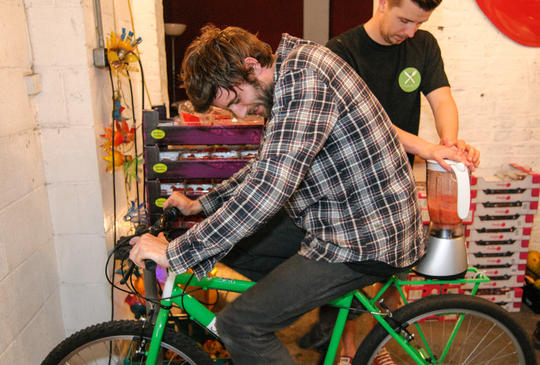
With each mango we save, it feels like a small vindication of the Pakistani water, soil nutrient and human labour that went into growing, harvesting, packing and shipping that fruit. It’s a seasonal glut, and not one that survives the global food system very well. But at Disco Soup, they made the most delicious smoothies, with just a modicum of skill and attention by volunteers to remove the skin and the bruised bits.
The same went for the Kenyan basil, Chilean grapes, Palestinian dates, Honduras bananas, Spanish melons: in the centre of Manchester, a little bit of love showed that this food was not just grown to make a profit on the market, but to nourish bodies, nuzzle tongues and nurture relationships.
While the event proved a great success, a debut will always provide learning opportunities. It coincided with Ramadan, excluding a significant portion of Mancunians. Lighting, fire alarms and washing up facilities will come higher up our list of priorities next time, as well as ways to get more passers-by joining in and to make it clearer how people can join in once they arrive: the combination of glittery hula-hoopers, food waste visuals and steaming, laden tables could appear perhaps confusing, but with the strength of commitment we saw in those willing to help out, the time is ripe for a follow-up.
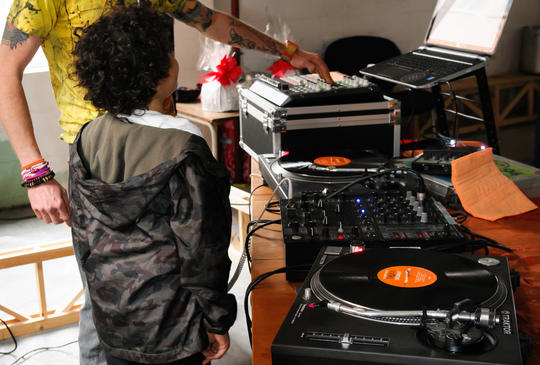
FoodCycle, MadDogs and Coffee for Craig took away a stack of meals to help feed the many hungry folk on our streets, but with more hands to chop and time we could have fed even more. Our city produces enough surplus food to do this every day, but what we need now is even more engagement.
Rustling up chocolate truffles in your disco pants on a Saturday afternoon: this is what cooking should be. But hungry people and mountains of good food thrown away is not they way it should be. As thousands marched on London to protest austerity measures, here in Manchester our full bellies and dance-worn feet bore visceral testament to the way things really could be.For more information about Disco Soup - check out the website (mostly in French) or follow Real Junk Food for news of future Disco Soups and other local food waste reduction efforts.
'Every day, tonnes of edible produce go to landfill/animal feed in Manchester due to a lack of people to do the sorting. If you can spare some hours to volunteer as an 'urban gleaner', please contact FareShare Greater Manchester (@FareShareGtrM) or visit their website.
All images courtesy of © Yveson
Perspectives essay: love food and hate waste
Contributed by Debbie Ellen and Lucy Danger
Manchester Film Co-op - an antidote to Weapons of Mass Distraction
Contributed by Laura Ager
Contributor Profile
Since moving to Manchester in 2013, Charlie has been getting entwined in activism and research through her work with Salford University’s sustainability team, assisting M:aCF’s Sustainable Consumption and Production strategy and discovering what it means to be a child of the Anthropocene in the cradle of the Industrial Revolution. She’s beginning a three year ethnographic study of household food waste, poverty and food redistribution schemes and would like to hear from anyone with interests and experience in this field- indranet [at] riseup.net



